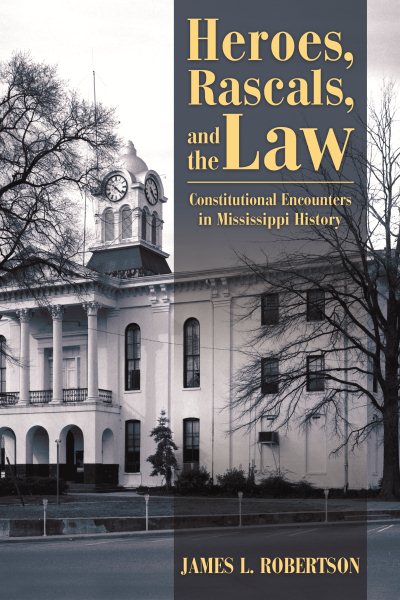By Leslie Southwick. Special to the Clarion-Ledger Sunday print edition (January 6)
Expectations about reading legal history likely start at boring and work down the tedium scale from there. With the right guide, though, a trip to historic places found on Mississippi’s legal landscape can intrigue the mind and stir the soul. Jimmy Robertson, it is clear, was the right person to narrate the journey in Heroes, Rascals, and the Law.
 Robertson is a former Mississippi Supreme Court justice, a long-time practicing attorney, and a frequent law professor. He recounts ten occasions from statehood to the late 1940s when the Mississippi constitution impeded or impelled justice. Fortunately for our enjoyment, John Grisham’s comment on the book’s cover that Robertson is a gifted storyteller is spot on.
Robertson is a former Mississippi Supreme Court justice, a long-time practicing attorney, and a frequent law professor. He recounts ten occasions from statehood to the late 1940s when the Mississippi constitution impeded or impelled justice. Fortunately for our enjoyment, John Grisham’s comment on the book’s cover that Robertson is a gifted storyteller is spot on.
No doubt, lawyers will appreciate the book differently than readers not encumbered by that knowledge. Yet all interested in this state’s history can enjoy and be enlightened by the stories. It helps that Robertson’s exhaustive explanations are expressed in a conversational style.
The first account is from 1818. A group of slaves who had lived with their masters in free territory for decades, were then brought to Mississippi to be sold in a slave market. Some of them escaped, found lawyers, and argued in court that their residing where slavery was barred had irrevocably freed them. The Mississippi Supreme Court had little legal precedent to direct it. Justice Joshua Clark, Robertson’s earliest hero, proclaimed that when the law was unclear, he would presume it would “be in favor of liberty.” The 28 slaves were declared to be free.
Among the quarrels are a few in which the legislature enacted controversial laws. In 1912, for example, the legislature limited a workday in the lumber industry to ten hours. Robertson explains why with his vivid descriptions of the dangers to the workers cutting the trees and those in the mills who lost their fingers, their arms and legs, and even their lives with appalling frequency. The Mississippi Supreme Court upheld the limit despite arguments that it interfered with the right of everyone to enter any contract they wanted.
Other chapters focus on officially approved lawlessness. One explores the blatant ignoring of statewide Prohibition laws in the “Gold Coast” in western Rankin County. Beginning in the 1930’s, the thirsts of Jacksonians could be quenched at such ramshackle establishments as the Red Top, Dipsie Doodle, the Silver Moon, and many more. The governor literally sent in the troops (the National Guard), and the Supreme Court later upheld his boldness.
Robertson is a tenacious biographical archaeologist, bringing to light what had been buried about those populating these historic events. Robertson is as concerned with giving narrative life to the parties in the lawsuits as to the public officials who arbitrated their disputes.
Justice Virgil A. Griffith is another hero the book allows us to know. He dissented in 1935 to allowing confessions that had been beaten out of three black suspects from being used at their murder trial. The U.S. Supreme Court soon vindicated Griffith’s dissent.
Another forwarding-thinking judge whom Robertson praises is Chief Justice Sydney M. Smith. He upheld legislation that allowed the state to experiment with ways to promote industrial development despite constitutional barriers reflecting the laisse-faire attitudes of earlier times.
Indeed, Robertson’s view of right and wrong in his chronicles is whether Mississippi’s constitution was allowed to be muscular or whether the dead hand of legal tradition restrained it. The author’s preferences are explicit, but he fairly discusses different perspectives.
Readers of all political persuasions will be entertained, enlightened, and even dumbfounded by what litigants and courts have gotten themselves into, and only sometimes out of, during 130 years of Mississippi history. The book is a triumph of storytelling.
Leslie Southwick is a judge on the U.S. Court of Appeals in Jackson. He is the author of a memoir, The Nominee: A Political and Spiritual Journey.
James L. Robertson will appear at the Mississippi Book Festival August 17 as a participant in the “Crime and the Law” panel at 4:00 p.m. in the State Capitol Room 201 H.



Comments are closed.